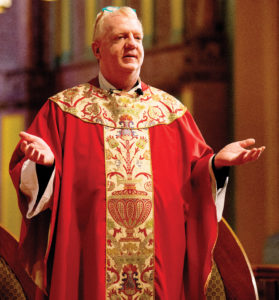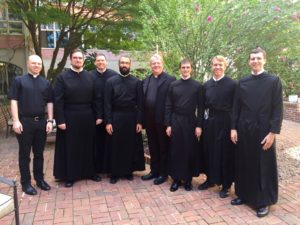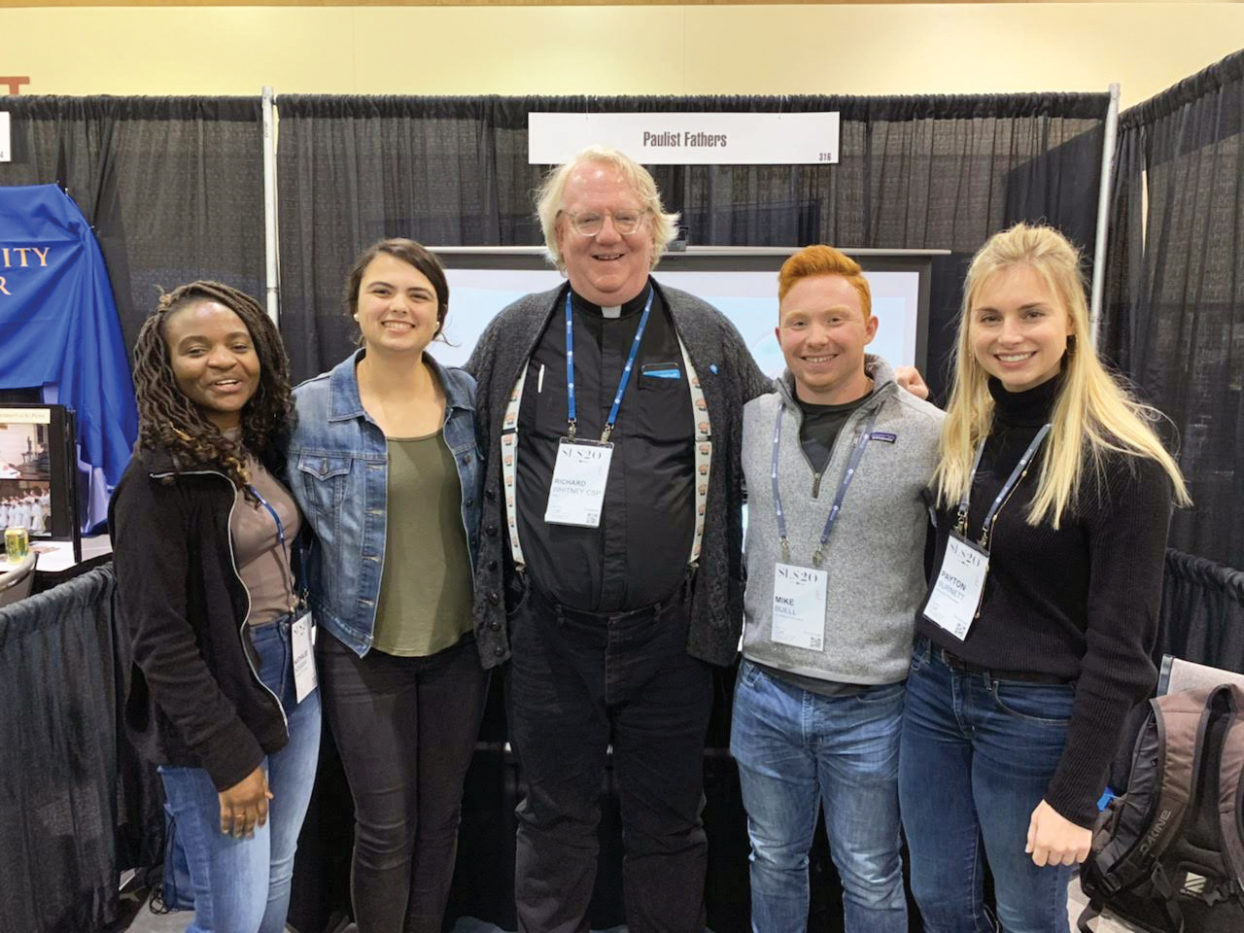Fr. Richard Whitney ‘juggling’ first year of priesthood, service on UT campus
By Gabrielle Nolan
Paulist Father Richard Whitney describes his first year of priesthood as a “whirlwind.”
“I don’t know that I’ve ever known time to fly by so happily before or in my life,” the 53-year-old priest said. “It’s been a year of growth, a year of wonder, a year of exploration, and a year of really hidden joys.”
Father Whitney was ordained on May 22, 2021, at St. Paul the Apostle Parish in New York City, which is the motherhouse for the Congregation of St. Paul (CSP).
He arrived for his assignment in Knoxville on July 1, where he serves as the associate pastor at St. John XXIII University Parish, located on the University of Tennessee campus in Knoxville.
Although a diocesan parish, St. John XXIII has been staffed by the Paulist Fathers since 1973.
In Father Whitney’s role, he supports the pastor in the events, functions, and day-to-day operations of the parish, in addition to celebrating Masses and hearing confessions. He also is the Catholic chaplain at the University of Tennessee Medical Center.
“We have a thriving parish, in addition to students,” Father Whitney said. “We have a number of people who have been here for quite some time, including some who have been here since the founding of our parish 52 years ago.”
He continued that “connecting with them and maintaining relationships” in the parish was a part of his role as well as working “to help students realize how important that transition is into becoming an adult Catholic, where the faith really needs to become one’s own and not what one necessarily grew up with.”
Father Whitney continues to be impressed with the “remarkable experience I hadn’t expected moving into campus ministry of the infectious energy of young Catholics, and how that really brings great hope to my world as well.”
“They’re wonderful, and I adore everybody here that’s part of our parish,” he continued. “They’re just a remarkable group of young men and women, and I’m fascinated to see what they will do in the years to come.”
When he reflected on his biggest surprises during his first year of priesthood, two things came to Father Whitney’s mind.
“I think the first surprise came about a week after I arrived here. The pastor went on vacation, and two days later the ceiling fell in in the main worship space. I sent a picture to my formator saying, ‘Six years and we never talked about this once,’” he recounted while laughing.
The second surprise was a bit more poignant.
“The amount of need that’s in the world, I think, has really hit home for me in this past year,” he said. “Because now that I’ve been privileged and gifted to be able to wear a collar and call myself a priest, that opens me up to people who are looking for relief in every different way: spiritual, personal, cultural.”
“People feel comfortable talking to priests,” he said. “And so, just the amount of pain that’s in the world has really struck me more than anything else, I think.”
A priest’s personality
Father Whitney likes to call himself an “outgoing introvert.”
“What tends to shock everybody, I admit this to… I’m about as introverted as you can get and not be a turtle,” he said. “I am not the life of the party when I’m not here.”
His favorite hobbies include activities he can do by himself: reading on the porch, dabbling in video production, and juggling. Yes, juggling.

Father Whitney is the latest of many Paulist Fathers who have served the University of Tennessee community for almost 50 years.
“I love to juggle,” Father Whitney shared. “I have a lot of juggling toys. I used to do some juggling performing on the street in (Washington,) D.C., never very good at it. But it was great fun, and it’s always fun to throw things in the air. One of my goals this year is to get back to, more or less, performance shape.”
“I’ve got machetes, but I can’t remember how to throw them yet. Torches are pretty easy, just don’t grab the bright end,” he quipped.
More than a fun hobby, though, juggling also has helped Father Whitney.
For a few years, he was an addiction counselor while working on his master’s degree in counseling psychology.
“I noticed that people who were able to embrace their spiritual nature were able to heal much more fully, completely, and easily than those who either weren’t exposed to spirituality or wanted nothing to do with it,” he shared.
“The analogy I often use is back when I was building scenery (for theater), I’d gotten to a point where I was pretty good at budgeting how long it would take to build certain things,” he continued. “Then I learned how to juggle, and the next project, which I budgeted four hours, took only about two and a half.
“On reflection, I realized that by learning how to juggle, I forced myself to acknowledge and use the left side of my body, which was new; I’m very right dominant. Embracing our spiritual nature is kind of like that experience.”
As for his own spiritual nature, Father Whitney enjoys his alone time to enter into prayer in the great outdoors.
“My favorite way to pray is probably sitting alone in nature at dawn or sunset,” he said. “That sense of grandeur and the remarkable scope of God’s creation is just all in front of us and that there’s no escaping it.”
“When we’re outside, I find that God’s creation is much more enriching, layered, wonderful, and stimulating throughout the day. And that’s been a real joy about being in Knoxville, is the beauty all around us all the time,” he said.
Father Whitney shared that he also appreciates the later wake-up call at sunrise.
“The fact that we are so much farther west than we were in Boston, dawn arrives at a much more civilized hour,” he said. “Oh, it’s delightful.”
A journey back to God
Born in Boston, Father Whitney and his family moved around a bit due to his father’s career in the military building and fixing ships.
“I was born and raised in a very Catholic family…and fell away from the Church at a fairly early age, suffering from primarily depression and a couple of learning disabilities,” he shared. “And so I was angry at God for making me different and stepped away from the Church quite vehemently.”
Father Whitney attended high school in Alexandria, Va., and began college at the Catholic University of America in Washington, D.C.

Father Richard Whitney, CSP, center, is shown during his novice year at seminary with fellow seminarians, who are now priests, as they prepare to attend the canonization Mass for Father Junipero Serra.
“I started at Catholic University in 1987 as an acting student and dropped out pretty quickly because I decided that the work backstage was steadier and more fun anyway,” he explained. “At the time, D.C. was exploding in the theater scene.”
“For those of us who liked working backstage, there was plenty of work. It was almost all backstage; I only had a couple of professional on-stage roles,” he said.
Father Whitney shared that he “picked up a couple of pretty nasty addictions in my late teens that carried through until I got sober” at the age of 37.
“I was told fairly early on, for cases like me, the fastest, easiest way to get sober and stay sober is to find God,” he said. “And at that point, being all about fast, cheap, and easy, I went to try to find God, which brought me back to the faith of my childhood. And I came back to church and found a wonderful community at St. Paul’s in Cambridge.”
Life started to fall back into order for Father Whitney, and he was feeling “very happy.”
“There was this little tickle in the back of my head in my early 40s of, there’s something that could be happening here, but I don’t know what it is because for the first time life is going well, and I have a community, I have a church, I have a job, everything’s fine—what am I looking for?”
He read a story about permanent deacons being ordained in Boston, and an idea ignited.
“I thought, ‘Oh well that’s what needs to happen, I need to look into becoming a permanent deacon,’” he said.
Around that same time, Father Whitney was stage managing a play for a friend. The play happened to be performed in the Paulist Fathers’ basement.
“That’s how I met the Paulist Fathers,” Father Whitney recounted. “And the Paulist Fathers brought a joy to the liturgy that I hadn’t known could exist. It’s almost as if everybody was very excited to share Mass and sacraments all the time. It was lovely.”
He talked to the Paulists’ vocations director, learning that they do not ordain deacons. So instead, Father Whitney decided to pursue the priesthood.
“I came to the realization that, you know, I can answer the call to the priesthood or not, either one is fine so long as I keep Jesus and his teachings at the forefront of my life,” he said.
As fate would have it, Father Whitney returned to Catholic University of America, some 30 years after leaving it, as a philosophy student studying in the seminary.
“With the Paulists, I have great expectations and hope because the guys that we have are just so inspiring in so many ways and come from so many different backgrounds,” Father Whitney said.
He noted that a lawyer, published author, medical doctor, cancer biologist, and schoolteachers are currently enrolled in their seminary.
“These are people who have seen the world, and some of whom have really successful careers, and yet still chose to step back, re-enter a dorm to live while they go to school in their 30s, late 20s, so they can become priests,” Father Whitney explained.
“God’s Spirit is still moving through us, and if we can find ways to listen to that, great things happen,” he said. “I adore all of my Paulist brothers deeply, and that gives me great hope for the future.”

